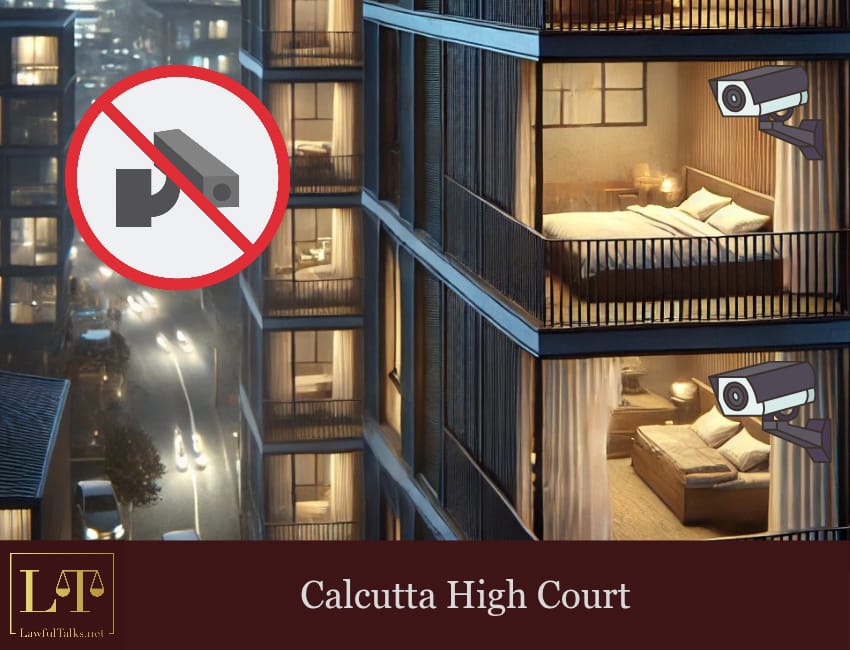Allahabad HC Sets Aside Afzal Ansari's Conviction, Allows Him to Continue as MP

Installing CCTV cameras within the residential section of a dwelling house without the consent of co-occupants or co-trustees infringes upon their right to privacy. A division bench of Justice Sabyasachi Bhattacharyya and Justice Uday Kumar of Calcutta High Court set aside an impugned order of a City Civil court that had rejected the Appellant’s plea for an injunction against the operation of such cameras.

The case arose after the appellant, Shuvendra Mullick, sought the removal of CCTV cameras installed inside the residential section of Mullick Bhaban, a family dwelling run by a private trust of Late Gora Chand Mallick. The trust deed, initially excluding the appellant, was modified to include him, granting him portions of the house.
Both the appellant and respondents lived in their allocated sections peacefully until 2022, till such a time when the respondents installed surveillance cameras without consulting the appellant. These cameras were positioned at entrances, windows, and corridors, allegedly monitoring the appellant’s daily activities. The appellant claimed he had no access to the footage or control over the recordings.
Following his concerns that were ignored by the respondents , the appellant was left with no remedy but to file police complaints in November and December 2023, but no action was taken. Subsequently, he moved the Executive Magistrate under Section 144(2) of the Code of Criminal Procedure, 1973, leading to a police vigilance order that was ineffective. He then filed a civil suit on April 2, 2024, seeking a declaration of his privacy rights, the removal of the cameras, access to footage, and an injunction against further installations. His plea for an immediate cessation of CCTV operations under Order XXXIX Rule 1 & 2, CPC, 1908, was denied by the City Civil Court on April 4, 2024, leading to this appeal.
The appellant argued that the cameras infringed upon his right to privacy by surveilling his personal spaces, particularly his bedroom and private areas, without his consent. He contended that the respondents had no authority to install such cameras without his approval as a co-trustee. On the other hand, the respondents defended their actions, stating that the cameras were installed to protect valuable antiques and artwork.
They argued that the cameras were placed in common areas and did not target the appellant’s private spaces. They also offered to adjust the camera angles and provide access to the footage.
A court-appointed Special Officer inspected the premises and confirmed that five cameras were positioned inside the residential section, with some directed toward personal spaces. Two of these cameras were found inoperative. The court noted that continuous surveillance within the appellant’s residence violated his privacy rights. In rejecting the respondents' argument, the High Court ruled that the operation of CCTV Camera nos. 5, 10, 11, 12, and 13 inside the residential portion of the property interfered with the appellant's right to enjoy his property with dignity. The court restrained the operation of these cameras and directed that alternative security measures be considered for protecting the valuables in the house.
The Supreme Court, in the case of Justice K.S. Puttaswamy (Retd.) and Anr. vs Union of India, had ruled that the right to privacy is guaranteed and protected under Article 21 of the Indian Constitution as an intrinsic part of the right to life and personal liberty. The dignity, autonomy, and identity of an individual must be respected and cannot be violated under any condition. The right to privacy is also recognized as a fundamental right under the International Covenant on Civil and Political Rights. In light of this, the High Court observed that the installation and operation of CCTV cameras inside the residential portion of a dwelling house without the consent of the co-trustee/appellant restricts his right to free enjoyment of property and constitutes a violation of his privacy.
In conclusion, the court ruled that both parties should have joint control over the CCTV system and its recordings while ensuring that privacy rights are maintained. The case was disposed of without costs, reinforcing the legal precedent that privacy cannot be compromised even within shared residential spaces.
Case Title: Mr. Shuvendra Mullick Vs. Mr. Indranil Mullick and others / F.M.A.T. No.172 of 2024
For the Appellant : Suddhasatva Banerjee, Prantik Garai and ors.
For the Respondents : Siddhartha Banerjee, Ayan Dutta and ors.




















































































































































































































































































































































































































































































































































































































































































































































































































